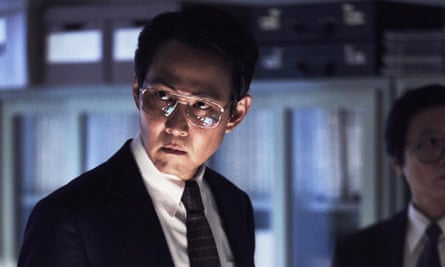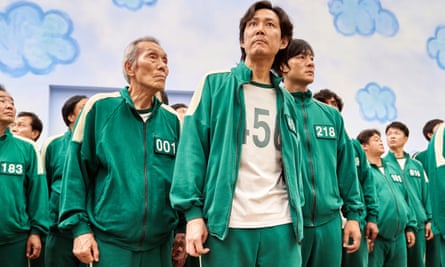The night before we meet in a central London hotel suite, Lee Jung-jae sat on a stage at a West End cinema, apologising profusely to the assembled audience. At a star-studded opening gala of the London East Asian film festival, Lee’s latest project, Hunt – an action-packed, OTT political conspiracy thriller set in 1980s Korea – had just been screened. But while the crowd whooped and cheered this hero of both the Korean small and silver screen, Lee had something else on his mind. “There is one important subtitle that is slightly wrong in the film,” he lamented, via an interpreter. “It read ‘keep my eyes on you’, when it should have been ‘watch over you’. The meaning was the same, but the nuance wasn’t quite right. And I’m truly sorry.”
Needless to say, amid the stream of explosions, shootouts and mysterious murders – a full-throttle two hours of twist and turns – few would have noticed this small subtitling snafu. So it’s testament to the weight of responsibility Lee feels in releasing Hunt, a film he has written, directed and starred in, that he opted to raise it immediately. Despite 30 years of industry experience in South Korea, where he is one of the country’s most recognised actors, Lee is making his directorial debut with Hunt. And with his lead role in Netflix’s smash-hit series Squid Game having catapulted the 49-year-old to global stardom, the world’s eyes are on him.
“I’m decades into the business as an actor,” Lee says, perched on an armchair in a dark grey suit. “I thought I understood the industry and film-making before I started on this project. But it turns out writing a script, directing it, producing it and taking care of the crew and cast opened up a whole new dimension.”
Set in the 1980s with a backdrop of the tense cold war between the two Koreas, the film is as complex as it is fast paced. Lee plays one of two competing intelligence chiefs in the South. Once a high-profile defector from the North confirms there’s a mole within their ranks, the two men – and their teams – are tasked with rooting out the rat by investigating each other. The high-octane opening sees an attempt made on the South Korean president’s life on American soil, with another assassination attempt planned. Some sequences are based on historical events while others are entirely fictionalised in this trust-no-one action drama.
It took Lee four years to get the film made. There were endless rewrites to the storyline and then the script, with which he hopes to make viewers question how and why their beliefs are formed. Initially, Lee had no intention of directing it. “I approached various directors to take it on,” he explains, “but when I set out my vision for the film many said I was asking too much.” Each, he says, had their own reasons for declining the opportunity. “It deals with some actual events from Korean history, which is complicated,” Lee says, starting to count off a list on his fingers. “Another thought that maintaining the balance of two lead characters would be difficult.” The action sequences were vast; depicting 1980s Washington DC, Korea (North and South), Thailand and Japan was too great a task. “You name it … ,” Lee smiles. “So, in the end, I had to direct it.
“I spent a lot of time preparing,” he is quick to add. “The crew were far more experienced than me. From the outset I told myself I would be honest with them: ‘I’m new, and don’t know lots, please teach me.’” He would hold endless meetings with every department, and spend evenings and weekends deep in self-set homework. “I completed seven acting projects in the time it took to make this film,” Lee says.
Lee has form when it comes to being thrown in the deep end, and being unafraid to admit when he is struggling. Born and raised in Seoul, he was working at a cafe in the city’s Gangnam district during his late teens when the designer Ha Yong-soo saw his modelling potential. “I was hoping to get a job at an interior design company,” says Lee. “But the modelling went well, and I kept getting called back.” He started to get cast in TV ads.
“And then I got this chocolate commercial which was a huge hit in Korea,” he explains, “which led to me being cast in a TV show called Feelings.” Almost overnight, Lee became a household name. In 1994, he starred in big-screen drama The Young Man, playing a manipulative male model. “But I was totally unprepared to be an actor,” he says, “thrown on set head first with no idea how to do it. It wasn’t fun. It was a horrific experience for me, and I was terrified. I realised I needed to study the craft. So I went to university, got my undergraduate degree then a master’s. Whenever I had time, I worked with an acting coach. I needed to learn properly.”

Over the following three decades, Lee’s career developed across genres. There were comedies and dramas, heists and romance; plenty reached international audiences. Then in September 2021, Squid Game was released on Netflix and immediately went supernova. Following a series of contestants competing in a series of deadly riffs on children’s games for a huge cash prize, the horror-thriller proved as dystopian as it was alarmingly believable. Once again, almost overnight, Lee’s career changed, this time from national treasure to international sensation.
“I’m happy about it, of course,” he says of the show’s success, “but it’s bittersweet. Yes, it’s great that audiences are consuming Korean content around the world. And they appreciate it. But if you think about the themes of Squid Game – how far are we willing to go to accumulate personal wealth; the lengths people are forced to go to – the fact it resonated with so many around the world is worrying. You get a sense this is the reality for so many people globally. And that makes me feel hugely sad.”
Squid Game makes for addictive viewing. There are high production values and impeccable acting, yes, but it’s the exploration of the limits that humankind can be pushed to that is most affecting. “And we had to express the experiences of these characters being pushed to those extremes,” explains Lee. “Doing that? It was terrible. The more beautiful the game set was, and the more childish and fun it seemed, the more horrific it was for the characters, and therefore us as actors.”
The show changed his life in a professional sense, but it’s left a more personal mark on its star also. “I do think about what happened in that show,” he says. “It’s impossible not to. And it made me think about what I’m not doing. Many of us live obliviously. It made me rethink how I look at the world. It couldn’t not.”
In September this year, Lee made history. At the Microsoft Theatre in Los Angeles, he won the Emmy for outstanding lead actor in a drama series. It was the first time the award had gone to an actor in a non-English-language show; Lee was also the first Asian man to win it. “The world is moving closely together,” he says of his win. “We’re seeing an increase in the exchanges between countries, and increased understanding. And we’ve realised that in art and culture, language needn’t be the first priority.” Historically, actors who don’t speak English as their first language have switched tongues to be recognised in Hollywood. Lee is proving that is no longer necessary. His casting in the forthcoming Star Wars series The Acolyte is further proof that, across the world, he’s now a figurehead of Korean culture.
“Of course I feel pressure,” he says, “a sense of responsibility. But if I were younger when this had happened I would have thought: ‘Wow, I need to work harder and impress people.’ But now it’s more of a realisation of what Korean culture can achieve. Some great Korean dramas could now make it on to the world stage. That’s exciting.”
It is a bold time, therefore, to be making a directorial debut. Especially with a film that’s so ambitious – in concept and delivery. Would he do it again? Lee takes a minute to think. “Let me just say,” he says, laughing now, “it wouldn’t ever be easy to make an action-packed film where I act and direct at the same time again. Another genre quite possibly.” Even for a grafter like Lee, it turns out that being simultaneously in front of and behind the camera for explosive set pieces is probably a one-off experience.
Hunt is in cinemas now.

